- Home
- Burt L. Standish
Wild Adventures in Wild Places Page 14
Wild Adventures in Wild Places Read online
Page 14
himself--the lordlylion. They determined to make this country their home for two or threemonths at the least, and with this end they built themselves and theirpeople huts high up on the green side of a swelling hill that overlookedthe lake.
The woods and the plains beyond, nature had stocked with herds of deer,the lake teemed with fish, there were patches of pine apples acres inextent, mango-trees, guava trees, oranges, citron, limes and pomolos,with bananas and plantains, and a hundred other delicious fruits theyknew not even the names of. Surely in a land like this, there was butlittle chance of their falling short of the means of subsistence.
But do not imagine they had not to rough it, for that they often had;nor that the sun always shone, for that it did not. Sometimes greatdark clouds would roll rapidly up from the horizon, and above them thefast disappearing blue of the sky looked preternaturally deep andintense, and from out these clouds the storm would burst in all itsfierce intensity, lightning such as they had never seen before, thunderthat seemed to rend the very hills, and rain that soon gathered intocataracts that steamed and foamed down the mountain sides, on their wayto the lakes beneath. These storms ended almost as quickly as they hadbegun, and probably our heroes would have minded them but very little,had it not been for the fact that, a few minutes before the rain beganto fall, scorpions, centipedes, and the largest and most loathsome ofspiders, came hastily trooping into the hut to seek for shelter. Whatinstinct teaches them to do this I wonder?
Many gigantic specimens of the rhinoceros fell before the fire of theirrifles. They afforded good but not always safe sport, as Frank one dayfound to his cost. He appeared one morning dressed "after the fashionof the country," as he termed it, with shoulders, arms, and face wellgreased and stained, and when he mounted his horse, every one wasobliged to admit that, to say the least, he looked "a noble savage."
Frank was greatly pleased at this, and away he rode, in company with hisfriend Chisholm, determined, he said, to put in a good day. There was aplain not far away from the encampment which Chisholm, who liked toretain Scottish nomenclature wherever he went, used to call the moor.Here, on this particular occasion, they had the good luck to fall inwith several rhinoceroses, and rare sport they had with them. They didnot wish to kill, they came out to chase, and rough though the groundwas, they had the best of it. Frank slung his rifle behind him, andwhen he got alongside any of the monsters he used his riding whip,causing them at first to increase their speed, but soon to lose temperand stand at bay, and use their terrible horns. This gave the young mana chance of showing his horsemanship off to perfection.
Several deer were brought down from the saddle, and, on the whole,Chisholm, and the noble savage Frank, made a glorious day of it, andwere returning about four in the afternoon, tired and hungry, when, juston the verge of the forest, lo! and behold, a rhinoceros scratching hischin, and looking as mild as any old cow.
Frank rode up to flick him with his whip. The beast backed for amoment, but charged again fiercely and furiously, the dead wood snapped,and, when Chisholm looked up, he saw his friend and horse rolling on theground. The next to roll on the ground was the huge beast himself, forChisholm was handy with the rifle. Frank got up smiling, and but littlehurt, but, alas! for the poor horse, he was stabbed to the heart. Thenoble savage had to ride into camp ignominiously perched on the crupperof Chisholm's saddle.
But perhaps the sport which our friends enjoyed above all others waselephant shooting, either on horseback or on foot, according to thenature of the ground. Of their haunts in the forests around the campthey knew nothing at first, nor did their Zanzibar boys, and the firstto lead them on their sport was young 'Mboona, the son of a king of oneof the native tribes, who had become servant and guide-in-chief to thecamp. His reward was to be a rifle, and well he earned it.
People who have never seen an elephant in his native fastnesses, canhave no idea of the strength, the ferocity, ay, and the cunning of theanimal. Our sporting party took back with them in the little _Bluebell_many hundreds of pounds' worth of valuable ivory, but if they did theyhad to pay for it with many a hard day's work, in many a wild ride, andmany a hair-breadth escape.
As a rule, the elephants would run when pursued by men and dogs; then,as they passed the spot where the rifles were stationed, they fell easyvictims to the hardened bullets. They were not always particular inwhich way they did run, however, and when they did not run right in thedirection of the guns, our friends would rush out in pursuit, when allat once perhaps the herd would be turned, and come crashing back uponthem and their people. They were not always angry; perhaps they werethinking more of escape than revenge; but to be run down by even a smallherd of cow elephants is no joke. Their feet are terribly heavy, andthey are not particular where they place them, so whenever a stampedewas checked and rolled back on the pursuers, it was _sauve qui peut_with a vengeance.
Frank was one day rolled down thus, while on foot, and not only down,but over and over; indeed the herd seemed for a time to be playing atfootball with him. He was covered from top to toe with blood and earth.
"Eton style of football is all very well," Frank said afterwards, "but Inever had such a doing as that before."
Chisholm had a worse doing, however. He had fired at, without killing,a gigantic bull. The brute was on him ere he could either reload orescape. He was picked up as one might seize a kitten, and dashed into atree beyond even the elephant's reach. The dogs would not tackle thismonster. Hearing the terrible screaming, Lyell rode down to attack thefoe next, but the wounded animal was careering madly through the forest,and trees that would be thought far from small in a park at home, weresnapping before him with the fury and impetus of the rush. Lyell hadserved in the Crimea, but he confessed himself he had never been nearerto death before, except once. He had been out shooting with a party inthe rough and solitary plains, that bound the Zulu land to the north andwest. They had come principally for buffalo-shooting, but they soonfound out that there was wilder game than these to be found; and on thevery first night on which they bivouacked under the stars, they werefain to entrench themselves well, and to keep the fires alight tillmorning, for every now and then they could hear the peevish scream ofthe hyena, the shrill bark of the jackal, and the appalling roar of thelion. Next day they found the carcases of the buffaloes they had slaintorn and devoured, and even their enormous bones broken and gnawed.Lions are not looked upon by the true sportsman as very brave animals,but a lion at bay, or a man-eating lion, is a terrible foe to encounter.
"One night," said Captain Lyell, "just as my biggest and strongestCaffre servant was putting the finishing touch to our laager, he wasseized by an immense lion and home away, as one might say, from our verymidst; borne away, shrieking for help, into the darkness of theadjoining bush. The silence that succeeded the shrieks made our bloodrun cold, for we knew that the poor boy was dead, and that the man-eaterhad commenced his revolting feast. We knew well, that having oncetasted human flesh, our camp, while he lived, would not be safe from hisattacks. We lost no time, you may be sure, in carrying out theexecution of our plans. It was a long weary day's work, and we wereabout to return to camp, too exhausted by the heat and fatigue to domuch more, when suddenly there arose a shout from the party nearest thelaager--a shout and a roar--quickly followed by the report of rifles,then more shouting and warning cries. Then I could see the tawnymonster appearing suddenly in front of us. I had no time to fire; mycomrade did, but I think he missed, and with a howl that seemed to shakethe earth, he sprang full upon me, seized me by the side, and bore mealmost fainting away, my two hands clutched in his murderous mane. Hecarried me far off into the jungle, running at first, then walking,finally lying down with his burden under a tree. The terrible moment,then, had arrived, he was about to rend me in pieces, and no power onearth could save me. Overcome by fear and weakness, and by the loss ofblood, I fainted, and was found hours after by my comrades in the samecondition, with the lion extended by my side--dead of his wounds!"
<
br /> ------------------------------------------------------------------------
The _Bluebell_ made many a run to different parts of the lake, and itwas during one of these excursions that Frank and Chisholm landed, forthe purpose of exploring a part of a forest that grew down close to thewater's edge. It was not a likely place for lions--they are fond ofmore light than this gloomy wood afforded--but they might, they thought,get a chance shot at an elephant. The ground was carpetted with moss,and, with the exception of monkey ropes, so called, the stems of thesturdy creepers, there was but little undergrowth. Chisholm and Frankstrolled on and on, fearing nothing.
How silent it is in that dark wood, and how still! Not a leaf moves,not a fern frond quivers, only high over head there is a gentle sighing,and when they gaze upwards they can see the sparkling of the leaves inthe sunshine, but that leafy canopy seems very far away.
Chisholm lags behind for a moment, he is looking to his rifle, andsighting it for close quarters. Frank strolls on. Suddenly the silenceof the forest is broken by the most terrible yells, and Chisholm rushesforward to find his poor friend in the clutches of a gorilla, with hisrifle torn from his grasp, and brandished high in air by the awfulbeast. But Frank, clutched by the throat, is quite insensible. Thereis not a moment, not a second, to be lost, and Chisholm fires almost atclose quarters, and the gorilla rolls dead at his feet.
It was well for both Frank and him that assistance was close at hand.Dreading some danger, Fred and Lyell had followed them into the forest,and come up just in time, for now the woods all around rang again withthe screams of the enraged gorillas, who, it would almost seem, had onlyallowed Chisholm and Frank to penetrate so far into their domains, withthe hopes of encompassing the destruction of both. But all the way backto the boat, it was a close hand-to-hand fight with these wild andterrible apes. Frank, once on board, and laid on deck, with the_Bluebell_ well clear of the wood, and the gentle breeze blowing in hisface, revival was a mere question of time; but he never forgot his firstand only encounter with the savage pongo.
CHAPTER THIRTEEN.
PART V--THE INDIAN JUNGLE.
A TETE-A-TETE DINNER--LETTERS FROM HOME--THE JOURNEY JUNGLEWARDS--THECAMP AND SCENERY AROUND IT--A SPORTSMAN'S PARADISE--LOST IN THE FOREST.
In a large and beautiful room in one of the upper storeys of a Club, onthe outskirts of Bombay, four gentlemen are seated at dinner oneevening, not long after the events related in the last chapter. It isevidently quite a _tete-a-tete_ affair, for they are all by themselvesin a corner, at the extreme end of the spacious apartment, close to thegreat windows that lead on to the verandah. The balmy evening air,laden with the scent of a thousand flowers, steals in, and is put inmotion by an immense punkah which hangs above them, and kept moving by alittle nigger-boy, dressed in a jacket of snow apparently, who squats ina far corner like a monkey, and requires the united efforts of the threeservants who wait at table to keep him awake. No matter what these menare carrying, they always stop as they pass to give Jumlah a kick,making some such remark as--"Jumlah, you asleep again, you black rascal!I kick ebery bit of skin off you presently?" Or, "Jumlah, you youngdog, suppose you go asleep just one oder time, den I break ebery bone inyour black body!"
The jalousies are wide open, for the day has been hot, and every breathof air is precious. Although the waiters indignantly refer to thecolour of poor Jumlah's skin, they themselves are black, though dressedin cool white linen.
You have guessed already who the gentlemen are. Let us follow them outto the verandah, where they have gone to sip their fragrant coffee.Stars are twinkling in the bright sky, fireflies flit from bush to bushin the gardens beneath, the distant sound of music falls upon their ear,mingling with the far-off city's hum, the beating of tom-toms, andshrill screams and yells, which may mean anything from mirth to murder.
Conversation during dinner had been very animated indeed; but sittingout here on the cool verandah no one seemed much inclined to speak.Frank had received letters from home, Fred had received letters fromRussia; and very pleasant letters, I ween, they were, for they borereading over and over and over again. Chisholm's letters were what hecalled "jolly enough," only as soon as he had read them, and laughedover them, he just tore them up and pitched them into the basket.
"Hallo, you fellows!" cried Chisholm suddenly. "Awake from yourslumbers."
"I wasn't asleep," said Frank.
"No; but you were dreaming, you young rascal."
"Do you know how _I_ feel?" said Lyell. "I'm feeling sad at thethoughts of parting with you fellows and going back to England."
"Then, my dear fellow, don't go," said matter-of-fact ChisholmO'Grahame.
"By George, then," cried Lyell, "and I won't. I'll apply for moreleave; and while the application is going home, and the reply comingback, I'll run off with you boys into the jungles. I know a deal moreabout the country than either of you."
"Lyell," said Chisholm, "I knew you were a brick the very first day Iclapped eyes upon you."
They were indeed lucky to have made the acquaintance of such a man asLyell. He had been pretty much at home in Africa; but in India he wasmore so; and as soon as he had made up his mind to go with our heroes,he commenced forthwith making preparations for the campaign against bigbeasts.
He explained everything he did to his three friends, and told them hisreasons for acting as he did. Tents were bought in Bombay, andadditional rifles--he was very learned on the subject of rifles andrifle-bullets--and Chisholm, being the biggest man, was furnished with aregular bone-smasher. Twenty servants were hired, and a boat waschartered to take their little expedition on to Madras. Just three dayswere spent in that city.
"If we stay any longer," Chisholm said to Lyell, "my young _confreres_will be starting lotus-eating again. Let us be off as soon as we can."
And so the very next day the journey up country was commenced: by trainat first, for a long long way; nobody was sorry when this part of thecruise came to an end at a station near a tall forest, with a name thatwas worse than Welsh to every one save Captain Lyell and a few of theattendants. By seven o'clock next morning, a start was made in thedirection of the south and east.
By the evening of the third day they had left civilisation a long waybehind them; they had journeyed on and on through vast tracts of janglelands, and mighty forests clad in all the rich and varied luxuriance ofa tropical summer. They had passed many a strange romantic hamlet; fromthe doors of the huts of grass and clay, little innocent naked childrenhad waddled forth to stare in wonder at the cavalcade, while the simpleowners offered them fruits of many kinds to eat, and water to drink.They were often tempted to get down and spend a few hours shooting, forthey came to places where feathered game of many kinds abounded,especially duck and peafowl. But Lyell's counsel was always taken, andhis advice was, "Let us go on as speedily as possible towards themountain forests, and there encamp." And so, as the last rays of thesetting sun shimmered down through the trees on them, they reached aspot which Lyell thought would do excellently well as a camping-ground.
"Oh, isn't this a charming sight?" said Chisholm, addressing Frank, wholounged on the howdah by his side.
They were a long way behind the others. They did not mind that,however; indeed, the elephant on which they were seated, pleased the twofriends far better than any other could have done. He was slow, butwondrous sure. No fears of Jowser, as Frank baptised him, taking suddenfright and dashing suddenly off and away over the jungle, as elephantssometimes do, and ending by dashing their brains out, or tumbling oversome mighty precipice with them. Jowser was somewhat more than ahundred years old--a very experienced matter-of-fact old fellow, whoknew better than to hurry himself. He required but little guidance--agentle touch with a cane on his left ear or his right, as the case mightbe, was quite enough for him. When he stopped short sometimes, to reachabove him for a few leaves to munch, his attendant would gently goadhim; but Jowser would turn up the tip of his trunk to him as much as tosay,
"Put a handful of rice into that. That's what Jowser wants.Jowser is hungry."
But it suited Frank and Chisholm to be a little late of an evening,because they found their friends already encamped, probably under thebanian-tree, and, better than all, supper ready--a curry of suchfragrance, that even a sniff at it would have made them hungry, if theyhad not, as they always did have, the appetite of hunters.
The master of ceremonies did allow them one day, however, among thepeafowl. In a piece of jungle--which Chisholm as usual persisted incalling a moor--they found these beautiful birds in great abundance:they were early astir that morning. They had their own beaters, whowere principally Mahratta men, whom they had engaged in Bombay, and whomLyell had armed with rifles as well as spears. "It is a mean thing,"this gallant officer said to our heroes, "to send a man into the bushunarmed; yet Englishmen constantly do it."
Independently of these they had volunteers from among the simple Hindoofolks in whose country they were. Brave, fool-hardy in fact, but as arule indolent, these men would work all day, for the sake of earning amorsel of tobacco.
It was a glorious day's shooting our sportsmen, had, and it was but oneof many such days they enjoyed, after their encampment at the foot ofthe mountains had been fairly formed. Neither of them were fond of whatis called battue shooting, deeming it, as every true sportsman must,somewhat unjust to the birds; but here there were very many mouths tofill, and four guns to do all the work of filling them. So they had tomake good bags.
And they did too. It was always their custom to be early astir, butthey did not start on an empty stomach you may be well sure; and theywere quite ready for luncheon at twelve.

 Dick Merriwell Abroad; Or, The Ban of the Terrible Ten
Dick Merriwell Abroad; Or, The Ban of the Terrible Ten Wild Adventures round the Pole
Wild Adventures round the Pole Storm-Bound; or, A Vacation Among the Snow Drifts
Storm-Bound; or, A Vacation Among the Snow Drifts In the Yellow Sea
In the Yellow Sea Frank Merriwell's Triumph; Or, The Disappearance of Felicia
Frank Merriwell's Triumph; Or, The Disappearance of Felicia Treasure of Kings
Treasure of Kings Bert Wilson's Twin Cylinder Racer
Bert Wilson's Twin Cylinder Racer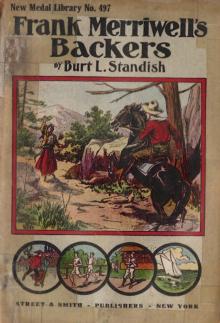 Frank Merriwell's Backers; Or, The Pride of His Friends
Frank Merriwell's Backers; Or, The Pride of His Friends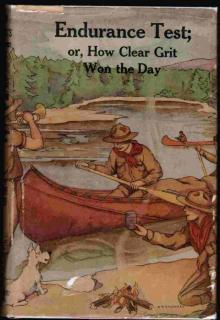 Endurance Test; or, How Clear Grit Won the Day
Endurance Test; or, How Clear Grit Won the Day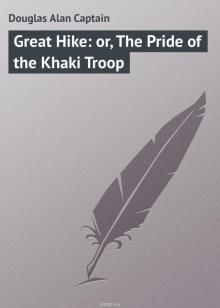 Great Hike; or, The Pride of the Khaki Troop
Great Hike; or, The Pride of the Khaki Troop The Swan and Her Crew
The Swan and Her Crew A cup of sweets, that can never cloy: or, delightful tales for good children
A cup of sweets, that can never cloy: or, delightful tales for good children Frank Merriwell's Bravery
Frank Merriwell's Bravery Frank Merriwell Down South
Frank Merriwell Down South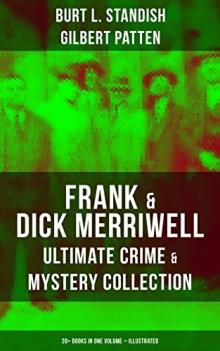 Dick Merriwell's Trap; Or, The Chap Who Bungled
Dick Merriwell's Trap; Or, The Chap Who Bungled The Trail of the Seneca
The Trail of the Seneca Wild Life in the Land of the Giants: A Tale of Two Brothers
Wild Life in the Land of the Giants: A Tale of Two Brothers From Squire to Squatter: A Tale of the Old Land and the New
From Squire to Squatter: A Tale of the Old Land and the New The Cruise of the Snowbird: A Story of Arctic Adventure
The Cruise of the Snowbird: A Story of Arctic Adventure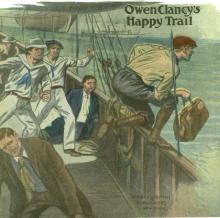 Owen Clancy's Happy Trail; Or, The Motor Wizard in California
Owen Clancy's Happy Trail; Or, The Motor Wizard in California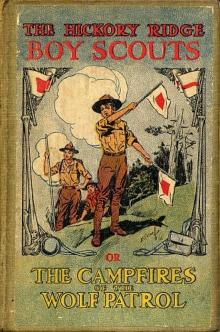 Boy Scouts: Tenderfoot Squad; or, Camping at Raccoon Lodge
Boy Scouts: Tenderfoot Squad; or, Camping at Raccoon Lodge Sing a Song of Sixpence
Sing a Song of Sixpence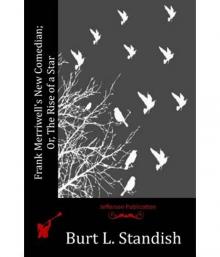 Frank Merriwell's New Comedian; Or, The Rise of a Star
Frank Merriwell's New Comedian; Or, The Rise of a Star The Sa'-Zada Tales
The Sa'-Zada Tales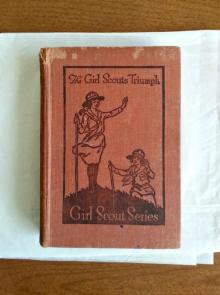 The Girl Scout's Triumph; or, Rosanna's Sacrifice
The Girl Scout's Triumph; or, Rosanna's Sacrifice Wild Adventures in Wild Places
Wild Adventures in Wild Places Fairies I Have Met
Fairies I Have Met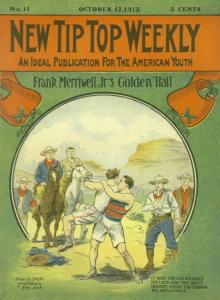 Frank Merriwell's Son; Or, A Chip Off the Old Block
Frank Merriwell's Son; Or, A Chip Off the Old Block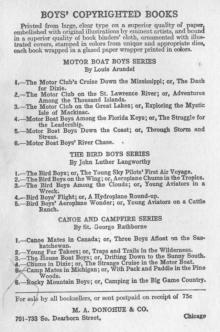 Motor Boat Boys' River Chase; or, Six Chums Afloat and Ashore
Motor Boat Boys' River Chase; or, Six Chums Afloat and Ashore Frank Merriwell's Athletes; Or, The Boys Who Won
Frank Merriwell's Athletes; Or, The Boys Who Won Bart Keene's Hunting Days; or, The Darewell Chums in a Winter Camp
Bart Keene's Hunting Days; or, The Darewell Chums in a Winter Camp Captain June
Captain June